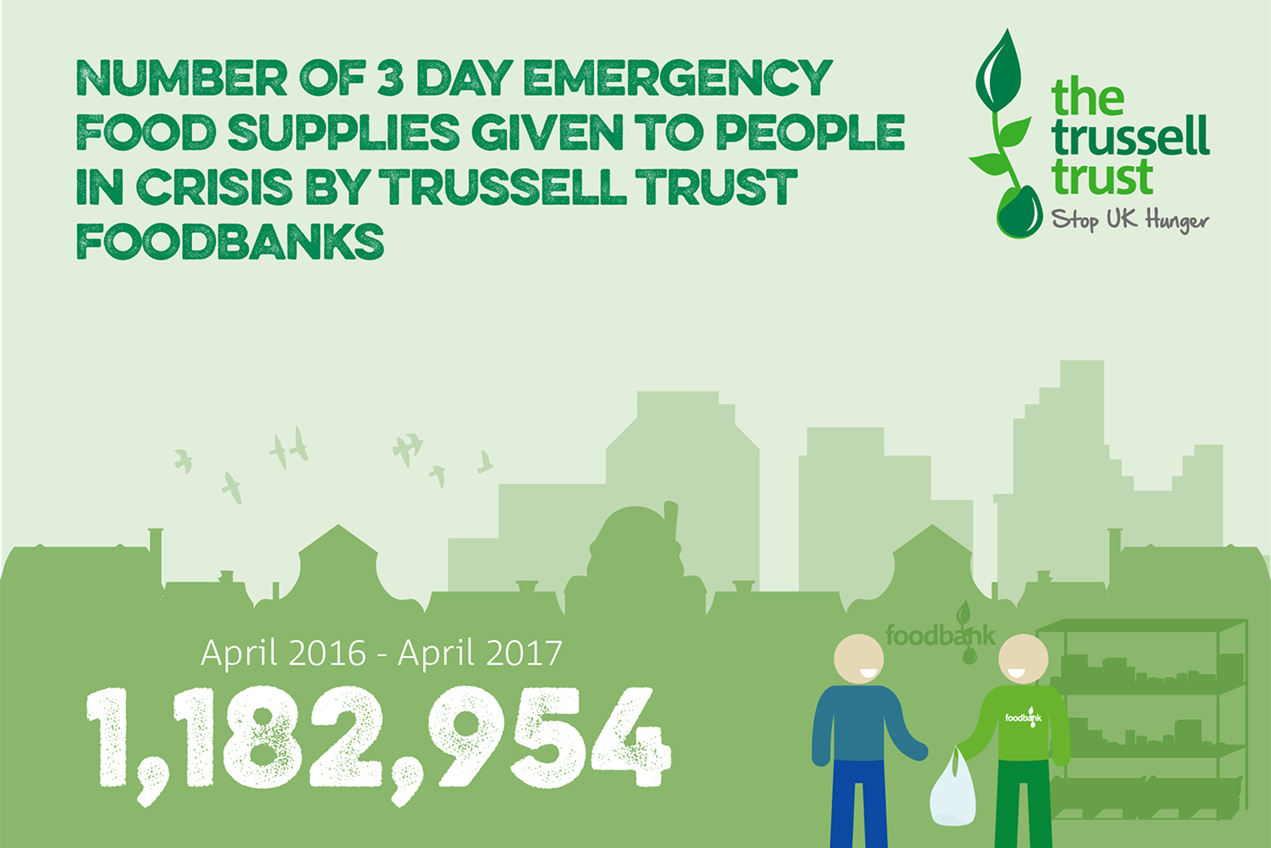Read the new report Emergency Use Only II
Three years ago, CPAG and the Trussell Trust were among the organisations who published Emergency Use Only, one of the first pieces of research to shed light on the drivers of the enormous increases in food bank use that we have seen this decade. We found that the immediate trigger for food bank use was all-too-often caused by the benefit system – through delays, errors, and sanctions – that prompted an acute income crisis, leaving households with little or no income. Turning to a food bank was often an action of last resort, once people’s other avenues of support had been exhausted.
Unfortunately, even though the report highlighted a number of relatively simple, practical steps that could be taken by Government to improve the situation, these problems mostly remain. As we approach Christmas, and with further roll-out of universal credit – with its in-built delay of over a month at the start of a claim – on the horizon, it is a sad reality that we can expect thousands of people up and down the country to be forced to rely on the kindness of strangers simply to eat. Our update to the original report, published today, is a reminder that it doesn’t have to be like this.
The good news stories presented in the report show just what can be achieved when food banks are able to connect people with advice which helps them access support they’re entitled to. Kingston Foodbank, for example, has a constructive relationship with its local Jobcentre Plus, and is in ongoing conversations about why people are being referred and what support the jobcentre can provide. The food bank has also been involved in workshops with Jobcentre staff to look at case studies of situations people face when they come to the food bank, so the two can develop advice to prevent those reasons for food bank use.
There are also reminders that additional support at food banks cannot be taken for granted. The report highlights a striking scheme at Coventry Foodbank, when welfare advisors were able to sit in food bank sessions and link people up with appropriate welfare support. 79% of the people who received consequent assistance from the local Citizens Advice did not need to use a foodbank again, and the foodbank believed the success of the project was part of the reason for a significant drop in foodbank referrals.
Unfortunately, the funding for the project has since ended, and Coventry Foodbank is once again seeing rising numbers of referrals. Latest statistics show that, in this city, as across the UK, increasing numbers of people who would otherwise face hunger are being referred for emergency food. It is heart-breaking that people need the help of charities to feed themselves, but it is not inevitable. There are valuable lessons to be learnt from these examples of best practice: the income crises that drive people to food banks can be prevented. Change is possible.
Priorities for action:
The report identifies a number of urgent priorities for action. The government’s recent Improving lives strategy paper is a good step in the direction of addressing some of the issues raised in this report, but there is much more still to do if we are to end the food bank emergency in the UK today.
- Sustain and improve access to emergency support
- Benefit advances: Include explicit mention of short-term benefit advances as part of the mandatory job centre scripts. Consider introducing automatic benefit advances if the benefit claim has not been settled after the target period. Permit welfare rights workers to submit short-term benefit advance claims on their clients’ behalf. Ensure that repayment plans are appropriate and affordable.
- Local welfare assistance schemes and their devolved equivalents: (which succeeded the social fund and provide either emergency cash, for essentials like white goods, or often non-cash support). There is a need to guarantee the future of local welfare provision, while not undermining the benefits of localisation, through introducing a clearer framework for delivery, including guidelines and requirements, for monitoring and evaluation. It would be greatly beneficial if ring-fencing and reporting duties similar to those for discretionary housing payments were introduced for local welfare assistance schemes.
- Increased support for people with ill-health and disability
- Employment and support allowance: Treat claimants awaiting a mandatory reconsideration (ie a DWP internal review of a benefit decision) in the same way as claimants appealing an employment and support allowance decision. Issue guidance to Jobcentres, advising them to scan and email medical certificates to the Department for Work and Pensions when a claimant’s existing certificate has expired or is about to expire. Mitigate the impact of missed appointments by avoiding the loss of all income, and allow those who have missed appointments to rearrange them and remain on employment and support allowance.
- Mental health: increased support for providing high-quality mental health training for its Jobcentre Plus advisers, so that they are well placed to understand and support clients with mental health difficulties, as well as increased sensitivity in benefit policy to the additional needs of people with learning disabilities and/or mental health needs.
- Review sanctioning: We have particular concerns about the introduction of in-work conditionality under universal credit, especially for people who are transferring from ESA to UC. Sanctions should be used as a last resort, and, if imposed, claimants should be clearly notified, with clear reasons given. Claimants should have the opportunity to change their behaviour before financial sanctions are imposed: a genuine ‘yellow card’ system. Sanctions should not be of a fixed period, so that claimants have an opportunity to have their sanction lifted if it spurs them on to engage with employment support – the stated goal of the policy. If claimants do have a financial sanction, they should be automatically considered for a hardship payment at the same time, to reduce the need for sanctioned individuals and families having to rely on emergency food provision.
Garry Lemon, The Trussell Trust
Alison Garnham, Child Poverty Action Group


